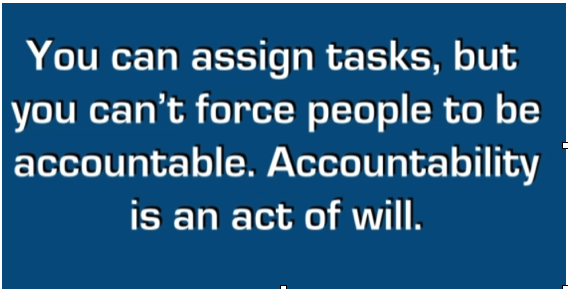
Accountability as an HR Leader
By The OD Company Admin - November 11, 2020Definition:
‘the fact of being responsible for what you do and able to give a satisfactory reason for it, or the degree to which this happens’
We all work in a team or have some form of interaction with others, where we collaborate and agree to pre-defined deliverables. This is across all sectors and functions within an organisation. It is extremely rare to find an employee that is not performing a role to accomplish something for their organisation.
On a personal level as an HR Leader Accountability is important to me as part of building relationships and owning my deliverables.
The concept of accountability particularly at work is important to an organisations’ success. Each employee is performing a role, no matter what level of seniority they hold. They are contributing to the success of the organisation and thus automatically share Accountability.
We have all heard of the story of JFK and the Janitor:
President John F Kennedy was visiting NASA headquarters for the first time in 1961. While touring he introduced himself to a janitor who was mopping the floor and asked him what he did at NASA.
‘I am helping to put a man on the Moon!’
The janitor not only shared and understood the vision, but he was demonstrating Accountability through his purpose.
Accountability is not unique to the function of HR; it is an everyday occurrence. Whether it is in the form of a personal or professional commitment, we are always committing to deliver something to others in our daily lives.
What happens when one does not deliver, what then? Once I have overcome my disappointment in not receiving what was promised. I seek Accountability. I expect Accountability. Why? I trust that people do what they say they are going to do. This is not just in work, but also in my personal life.
When I asked my 13-year-old, what does Accountability mean to you? He so clearly answered ‘you do what you say you are going to do’. I could not have said it better or more simply myself.
What really happens when commitment is not kept, trust is broken and relationships breakdown, trying to rebuild this becomes almost impossible.
What does Accountability mean for HR?
An essential part of my philosophy as an HR Leader is to deliver. I deliver on time. I deliver with excellence. I deliver what is promised. It is realistic that sometimes this may not happen for various reasons, so what then? Then I am Accountable for this non-deliverable. I take the responsibility and I own my work.
But why is it so important? It is important because as HR leaders, we are promising to deliver in everything we do. We deliver talent, we deliver on our strategy, we deliver results. I make things happen. I ensure that I or my team is enabled to deliver the results that are expected and promised by us. Accountability of HR is there for the whole organization to see and impacts individuals directly.
When I do not find Accountability within my team or my stakeholders, I am disappointed. I distrust that they can deliver in the future, and I lose confidence in the people that I am collaborating with daily. Trust which is important in forming relationships that are reliable and committed. Collaboration and teamwork are both essential to delivering an organisations vision and strategy and trust is vital to that team collaboration.
I ensure I role model Accountability and as an empathetic leader I see it from my team’s perspective. If they are delivering in their role and I am not, then why should they continue to deliver. What keeps them motivated if their leader is not leading by example? To engage and motivate my team I ensure that I hold myself Accountable when the need arises and build that trust and reliability. The bottom line is ownership, responsibility and Accountability must be role modelled by the leaders of the organisation to embed it into the organisational culture.
I always ensure that when dealing with stakeholders, employees, or clients that I manage their expectations to ensure that any delay in delivering is communicated to them openly, transparently and with a proposed solution. I do not bring problems or issues to my customers but come with a solution. This demonstrates accountability – acknowledging the issue and aiming to do something about it.
Can we, HR Professionals mandate Accountability?
As an HR leader I know that we cannot mandate an employee to take Accountability, but we can create an environment where employees value Accountability and become accountable to one another. This in turns provides an environment which provides HR a sense of personal responsibility to the organization, their colleagues, and the bigger picture.
The culture can be role modelled by HR and when results are not delivered it is owned and in turn celebration of successes and recognition of employees who do deliver.
As an HR Professional you may not be able to enforce an organisational change which embeds accountability, but you can role model accountability and influence, if not the organisation at least your colleagues. Do not forget the uniqueness of our role; HR is at the heart of the organization’s vision, culture, and people. HR is the only department that could have an impact on every employee in the company.
People feel accountability when they have ownership therefore a culture demonstrating accountability will empower employees to have ownership over their work and in turn personal responsibility to deliver.
Please if there is one thing that you take away from this article, as an HR Leader.
Role model Accountability in your organisation.
What are your thoughts on having Accountability in the HR profession?